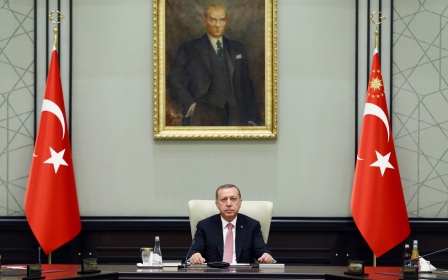Turkey's Erdogan announces three-month state of emergency

ISTANBUL, Turkey - Turkish President Recep Tayyip Erdogan introduced a three-month state of emergency on Wednesday after a failed coup that aimed to oust him from power.
Erdogan issued a statement outlining the state of emergency after an extraordinary session of the country's National Security Council in Ankara, which lasted for four hours and 40 minutes, and a two-hour cabinet meeting.
“After a meeting of our National Security Council we have decided to impose a state of emergency for three months based on article 120 of the constitution,” Erdogan said in a live televised appearance in Ankara.
“This is not a move against democracy or the rule of law. In fact it is a move that will protect the rights of our citizens and that also protects our democracy.”
A state of emergency gives expanded powers to the interior ministry and the country's regional governors. Some of these extended powers include the ability to detain people for longer periods of time, easier access for search and arrest warrants, and more stop and frisk powers to the police.
The state of emergency will come into effect as soon as the cabinet presents it to parliament for approval. However, no officials have commented on when that might take place.
“As commander of chief I say we will continue to clean this virus [coup plotters] with the help of the military and all other forces at our disposal,” Erdogan said.
Erdogan also tried to reassure international investors by saying that Turkey has a stable economy.
“I assure you all that Turkey will not veer from its economic path. I assure you that Turkey remains as safe as ever for investments. Turkey will continue its economic reforms without interruption,” he said.
"There is no liquidity problem in the market and there won’t be. We will stick to our path of financial discipline.”
“Our government, political parties and civil society organisations have shown their commitment to democracy and the rule of law. I am proud of my nation, regardless of political parties,” Erdogan said.
"Our nation stood up for the state and the state stood up for the people,” he added.
His statement comes after a fresh wave of sackings and investigations throughout Turkey’s government. About 50,000 people have either been charged, arrested, sacked or suspended from state departments, including justice, education and defence since the attempted coup on Friday.
Erdogan earlier on Wednesday told Al Jazeera only a minority of the military participated in the coup.
Speaking in Turkish, Erdogan said: "It is clear it was a minority (of the armed forces). The terrorist organisation was trying to make the minority dominate the majority."
He said Turkey had not "come to the end of it," and added that authorities were working within the law to pursue alleged plotters.
Speaking to CNN-Turk before the announcement was made, Mustafa Sentop, a AKP MP and chair of parliament’s constitution commission said: “All constitutional steps will have been analysed and is natural.”
“After such a barbaric attack by a gang using planes and tanks that belong to the military, steps have to be taken to prevent such a thing from happening again and every single aspect needs to be researched,” said Sentop.
“France also introduced a state of emergency after the Paris attacks. What Turkey is facing [is] a bigger threat. Not to compare but we are talking about an attempt to topple the government.”
Turkey's justice ministry on Wednesday released a list of 99 generals and admirals charged in connection with the coup, representing about a third of the military's top brass.
The defence ministry also said it had launched investigations into every single military judge and prosecutor in Turkey.
A total of 262 military judges and prosecutors have already been removed as part the investigation, it said.
The country's higher education board meanwhile banned all academics from foreign travel. It announced 6,538 state workers had been suspended on Wednesday, bringing total suspensions to more than 20,000.
The education ministry launched action to shut 524 schools, for "engaging in acts that threaten the constitutional order".
More than 20,000 private teachers have also had their licences revoked.
Turkish media also reported that Levent Turkkan, a lieutenant colonel and aide to General Hulusi Akar, had confessed to helping the coup.
According to a written statement presented to media, Turrkan also admitted being a member of the movement led by Fethullah Gulen, a Muslim cleric living in self-imposed exile in the US whom the government has claimed was behind the plot.
Two constitutional court judges, Alparslan Altan and Erdal Tercan, were placed under formal arrest.
Also placed under formal arrest was Colonel Ali Yazici, chief military aide to Erdogan.
The sports ministry has dismissed 245 employees, state media said.
Amnesty International said on Wednesday that authorities had blocked access to more than 20 news websites, cancelled press cards for 34 journalists, and issued an arrest warrant for one for her coverage of the coup.
Middle East Eye propose une couverture et une analyse indépendantes et incomparables du Moyen-Orient, de l’Afrique du Nord et d’autres régions du monde. Pour en savoir plus sur la reprise de ce contenu et les frais qui s’appliquent, veuillez remplir ce formulaire [en anglais]. Pour en savoir plus sur MEE, cliquez ici [en anglais].




